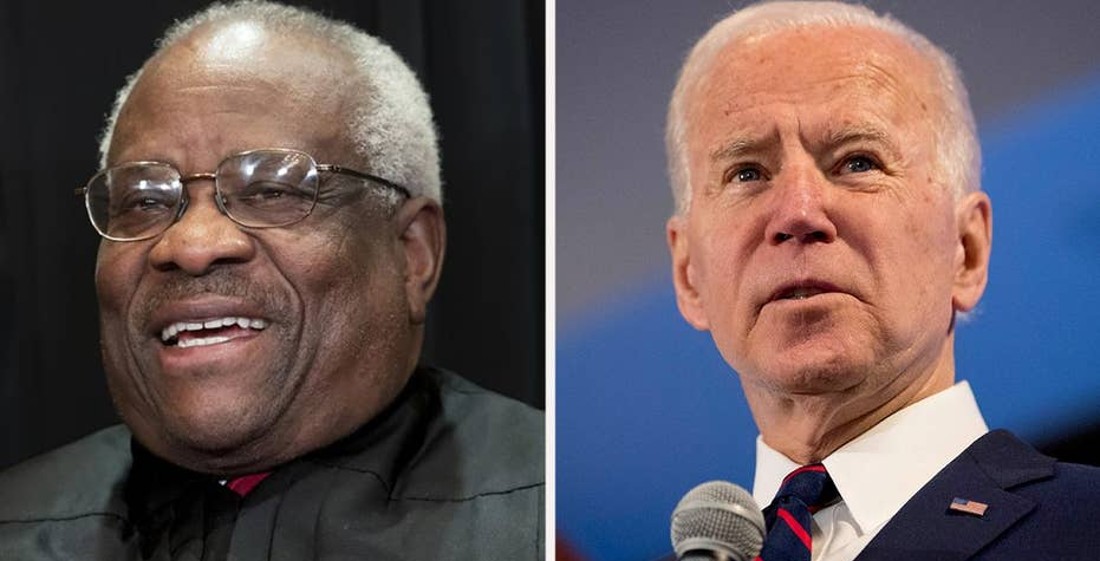OPINION: This article may contain commentary which reflects the author's opinion.
Supreme Court Justice Clarence Thomas peppered the Biden administration with questions regarding the president’s student loan giveaway during oral arguments this week, signaling he does not believe that the White House had the constitutional authority to do it.
The Supreme Court justices listened to arguments in two cases concerning President Biden’s student loan forgiveness program on Tuesday. The first case, Biden v Nebraska, involved six Republican attorneys general who contended that the program is an overreach by the president.
US Solicitor General Elizabeth Prelogar, arguing on behalf of the administration, stated that if the pause on payments is allowed to end without some sort of plan in place, “it’s undisputed that defaults and delinquencies will surge above pre-pandemic levels.”
“The states ask this court to deny that vital relief to millions of Americans, but they lacked standing to seek that result,” she also said.
Continuing, Prelogar argued further that “the states say the act doesn’t authorize the [Education] secretary to ever forgive loan principal. But the secretary’s interpretation of this text is not just a plausible reading, it’s the best reading. Congress expressly authorized the secretary to waive or modify any title for provision in emergencies to provide financial relief to borrowers.”
Thomas queried whether a waiver or modification could equate to the cancellation of student loans. In response, Prelogar pointed out that the HEROES Act, implemented after 9/11, grants the education secretary certain measures that could be implemented during a national emergency, according to The Post Millennial. But critics like Thomas say that the HEROES Act was specific to emergencies arising from the Sept. 11, 2001, terrorist attacks, not a pandemic two decades later.
Thomas further asked Prelogar to clarify the distinction between the cancellation of student loan debt and grants that Congress is responsible for appropriating.
“There’s some discussion in the briefs …. that this is in effect a cancellation of a debt, that’s really what we’re talking about, and that as a cancellation of $400 billion in debt, in effect this is a grant of $400 billion and it runs headlong into Congress’ appropriations authority,” he said.
Prelogar responded that the student loan program “doesn’t require any money be drawn from the Treasury, and so I don’t think that it strictly raises an appropriations issue.”
Meanwhile, President Biden said this week following the arguments portion of the case that he wasn’t “confident” the loan giveaway would pass constitutional muster under the parameters established by a majority of justices.
“President Joe Biden told reporters Wednesday he is not confident the Supreme Court will uphold his executive order to cancel up to $20,000 of federal student loan debt for tens of millions of borrowers—a day after the court’s conservative majority seemed skeptical of Biden’s authority to enact debt relief,” Forbes reported.
Biden said outside the White House he’s “confident we’re on the right side of the law, but I’m not confident about the outcome of the decision yet,” according to a White House pool report.
Justice Brett Kavanaugh said at the hearing that “some of the biggest mistakes in the court’s history were deferring to assertions of executive or emergency power,” while liberal justices, like Elena Kagan, defended the move as legal under the “very broad language” of the 2003 HEROES Act, Forbes noted further.
At one point during arguments, Justice Sonia Sotomayor insisted that the language of the act was entirely broad enough for the Education secretary to authorize student loan forgiveness as a result of the pandemic.
“The secretary can add terms and conditions to be applied in lieu of such statutory and regulatory provisions. So it’s really quite clear here like you can waive or modify the old ones, and then you can add new ones in lieu of the old ones. So, you know, Congress could not have made this much more clear,” she said.
Nebraska Solicitor General James A. Campbell, who argued on behalf of the half-dozen states that filed suit, disagreed, stating that “it can’t be adding just anything the secretary wants.” He also pushed back on the suggestion “that this is a constitutional authorization because it’s not a modification, it goes way beyond that, it creates a brand new program, and that’s not what the HEROES Act allowed.”
